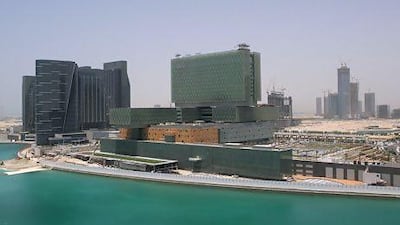Abu Dhabi will soon start scouring the globe for the sharpest financial and legal minds to head up the management of its new financial free zone.
Recruitment for Abu Dhabi Global Market (ADGM) will be a priority for the zone's new directors when they hold their first board meeting in the coming weeks, according to Mahmood Ebraheem Al Mahmood, the chairman of ADS Holding, the lead and strategic consultant for the project.
The directors will be looking to fill positions to lead the zone's three pillars: the Global Market's Registration Bureau; the Financial Services Regulations Bureau; and the Global Market's Courts.
But first the board will assign advisers to help oversee the project, Mr Al Mahmood said yesterday.
ADGM will then launch a promotional campaign to create awareness about the zone across leading financial centres around the world. The board's creation also means it can begin taking applications from financial companies interested in setting up in the free zone.
Among the businesses ADGM hopes to attract are commercial and investment banks, foreign exchange and commodities traders, brokerages, investment and pension funds, financial consultancies, Islamic financial firms and related financial services providers.
Abu Dhabi's aim to build a major financial centre is gathering pace following the announcement on Monday of a chairman and board for ADGM. Ahmed Ali Mohamed Al Sayegh, the chief executive of Dolphin Energy and chairman of Masdar, was appointed as the chairman, with four other senior figures from business and government also on the board.
The UAE issued a decree in February to create the zone on Al Maryah Island.
Questions have been raised about how ADGM will compete in a local financial landscape that is also home to the Dubai International Financial Centre (DIFC). But officials are keen to emphasise how Abu Dhabi will offer something different.
Its biggest selling point, they say, is the potential to serve investors in global securities during the so-called "black zone" when most Asian, European and American markets are closed.
"ADGM will start to take a lead in financial markets from 7am to 11am [3am to 7am GMT] when it will market-make and produce a price across a range of [foreign exchange] and [over-the-counter] products," Mr Al Mahmood said.
"Outside of these hours it will offer a full range of financial services acting as a bridge between the markets in Asia and those in Europe."
Mr Al Mahmood added: "ADGM will also offer for the first time in the region new financial products. ADGM will be able to host a full range of financial institutions, commodities and producers as well as local and regional service providers."
Unlike DIFC, ADGM will also aim to specialise in the handling of physical commodities, which would be shipped in via Abu Dhabi's Zayed and Khalifa sea ports, the airport and Etihad Rail.
"In that regard, the Global Market will have a significantly different emphasis from other regional financial free zones," lawyers at Allen & Overy, which has acted as the sole legal counsel for ADGM, said in a report this month. "Accordingly, the Global Market legislative framework will include regulations addressing the trading, storage and transport [by air, rail, sea, and road] of commodities."
ADGM will be the latest free zone in Abu Dhabi after the creation of the Khalifa Industrial Zone Abu Dhabi (Kizad) in Taweelah. But it may not be the last. The board of directors will have authority to establish non-financial free zones elsewhere in Abu Dhabi, subject to Executive Council approval.
Officials say the laws governing the zone are based on international best practice as well as feedback from major financial companies around the world. For example, the supervisory model is to be tailored to reflect the dual supervisory approach used in financial regulation in Switzerland, they say. This is in contrast to the model used elsewhere in the region where a single supervisory body is often used.

